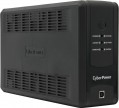Bypass (direct connection)
Bypass(by-pass) means such a mode of operation of the UPS, in which power is supplied to the load directly from an external source — the mains, diesel generator, etc. — practically without processing in the UPS itself. This mode can be activated either automatically or manually.
— The automatic bypass is a kind of safety measure. It turns on when the UPS in normal mode cannot supply power to the load — for example, when the UPS is overloaded due to a sharp increase in the power consumption of the load.
— Manual bypass allows you to enable this mode at the request of the user, regardless of the operating parameters. This may be necessary, for example, to hot-swap a battery (see below for details) or to start equipment that has a starting capacity greater than that of the UPS. Technically, it can also play the role of a security measure, but automatic systems are more reliable in this sense.
Some UPSs provide both options for enabling the bypass.
Socket type
A socket for a specific type of plug in the UPS design.
—
Type F (Schuko). A traditional European socket with two round holes in the center and grounding contacts in the form of two metal brackets (at the top and bottom of the socket). The term Schuko stuck to this type of socket due to the abbreviation from the German Schutzkontakt - protective contact.
—
Type E (French). The French style socket has two round holes and a protruding ground pin just above them in the center. The standard has become widespread in France, Poland and Belgium (along with the traditional type F sockets).
—
Type G (British). The plug for such sockets consists of two flat horizontal pins and one flat vertical pin for grounding. The standard is found mainly in the countries of the United Kingdom, Malta, Cyprus, Singapore and Hong Kong.
—
Type B (American). American-style sockets are designed for plugs with two flat prongs and a semicircular grounding contact. Type B is widely used in regions with voltage 110 - 127 V - USA, Japan, Saudi Arabia, etc.
Surge protection
The maximum energy of an electrical impulse in the mains that the UPS is able to compensate. Short pulses with high energy from time to time can occur in almost all networks — for example, due to interference from powerful radiation sources or due to poor-quality operation of lightning protection on power lines; for unprotected devices, such fluctuations can be very harmful. The greater the amount of absorbed energy, the higher, respectively, the level
of impulse protectionprovided by the UPS.

